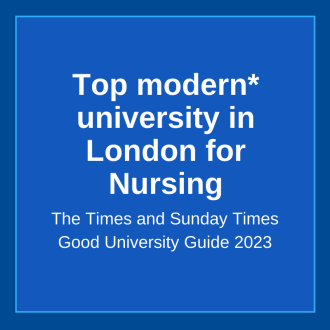- Postgraduate
Infection Prevention and Control MSc
Overview
They say prevention is better than cure – so join an important and growing area of healthcare to help combat infection.
This course will help you develop specialist knowledge and become an expert practitioner in the field of infection prevention and control.
In addition, you will gain the relevant knowledge and skills required to be an IPCP (Infection Prevention and Control Practitioner) which enables you to translate and apply these core principles across different acute and secondary healthcare settings.
You will achieve the following qualifications in Infection Prevention and Control:
- a PgCert (after completing your first year)
- a PgDip (after completing your second year)
- MSc (after your third year)
To be eligible for the MSc qualification, you must complete all modules within four years.
It is also possible to take single modules as Continuing Professional Development (CPD) but such arrangements need to be first discussed with the course leader.

Select your desired study option, then pick a start date to see relevant course information:
Start date:
If your desired start date is not available, try selecting a different study option.
Why study Infection Prevention and Control with us?


What our students say…
The face to face sessions and the laboratory work are both essential components of the learning process. I have been blown away by the superb teaching, knowledge and support from my lecturers. I would highly recommend this course.




Course detail & modules
This degree course combines specialist Infection Prevention and Control knowledge with skills in improvement science – both critical to the specialist role.
The first year is mainly delivered by face-to-face attendance format, which is a key advantage for facilitating the formation of peer networks. This is crucial for working in infection prevention as peer access encourages the sharing of best practice.
The portfolio-based learning approach enables you to develop the critical knowledge and skills relevant to your own workplace and ensures you develop appropriate competencies to meet the requirements of your role.
Additionally, a proportion of the content is delivered by subject experts, ensuring optimal learning.
After the first year, you will achieve a PGCert, having acquired the necessary expert knowledge and skills to operate effectively as a junior IPCP.
You then have the option to extend your studies through PgDip and MSc level developing your knowledge and skills in leadership, improvement science and project management in preparation for more senior IPCP leadership roles.
The two improvement science modules and project in Years 2 and 3 will be especially relevant as your role requires you to facilitate change and lead improvement across a wide range of healthcare settings.
It is possible to take individual modules without registering on the MSc programme, but this will need to be discussed with the course leader.
How is this course taught?
Study days vary in each academic year as follows:
Year One: Three specialist IPC modules:
- Module 1 commencing October: 5 full and 2 half study days
- Module 2 commencing February: 6 study days
- Module 3 commencing May: 6 study days
Year Two
- One module: 6 study days
- Two modules: 4 study days
Year Three
- Single module: 4 study days during the year
Compulsory modules
-
Healthcare Associated Infections: Scientific Principles
This module introduces the practitioner to the high level of expert knowledge that will provide a solid grounding in the sciences underpinning infection prevention and control.
This includes theoretical and practical microbiology, mechanisms of antimicrobial resistance, sources and transmission of infection, types, immunology and host defences, incidence and impact of healthcare associated infections.
Principles of decontamination and defining and assessing risks of HCAI in different healthcare settings.
-
Infection Prevention and Control in Clinical Practice
This module will introduce you to the epidemiology of healthcare-associated infection and to prevention strategies for different types of infection. You will also look at healthcare environments and the evidence underpinning them, such as antimicrobial stewardship, surveillance and audit as tools for driving infection prevention.
-
Driving Improvement in Infection Prevention and Control
This module enables the practitioner to explore complex factors that affect human behaviour, the principles of improvement and implementation science, strategies to detect and manage outbreaks of infection and governance systems for preventing and controlling infections. Students will apply improvement science methods to an infection prevention problem and develop strategies to improve practice.
Compulsory modules
-
Leading and Sustaining Improvement
This topic area pulls together the human side of working to change services. It comprises the learning gathered from psychology, human resources, industry and academia on the disparate but cumulatively effective topics of leading change, managing change in healthcare, and sustaining that change beyond the life of the project.
The interaction between individuals is considered, the resistance and barriers that others have experienced, and the issue of effective team working is also considered within this topic area.
-
Epidemiology and Biostatistics
This course introduces the principles and methods of epidemiology, with an emphasis on critical thinking, analytic skills, and application to public health practice and research.
The module explores the main types of:
- epidemiological study, their design, strengths and weaknesses
- measures of disease and association
- sources of error in research
- the use of epidemiological methods, how to search for primary research evidence using bibliographic databases
- critical review
- appraisal of primary sources of epidemiological evidence (scientific journal articles)
- the ethical and legal basis for undertaking epidemiological research.
-
Evidence Based Implementation of Improvement methods
Compulsory modules
-
Improvement Project
This module is equivalent to a dissertation seen in many other Masters degrees. It comprises the undertaking of an improvement project, a literature review and a robust write up of the findings of the research.
Underlying the core of the Masters course is the improvement project undertaken in your workplace.
You will work with a supervisor to scope the evidence, plan, prepare and carry out data collection before a comprehensive write up of the project and demonstrate discussion of any improvements.
Entry requirements
You should have a first degree in a relevant field and already be working as an Infection Prevention and Control Practitioner (the latter must be at least 50%of your role).
If you do not have a first degree there may an alternative route to access the course. Please contact the Course Leader (Dr Neil Wigglesworth) to discuss options.
We look for students who show enthusiasm and a passion for the subject through previous study or professional experience.
If you have any questions about the relevance of your qualifications or experience please contact the course leader shown in the teaching staff.
Fees & funding
Fees for this course are available upon request with Post Reg Admissions (PostRegAdmissions@uwl.ac.uk) or the Course Leader, Dr Neil Wigglesworth (neil.wigglesworth@uwl.ac.uk).
Funding your studies
You may be eligible for a student loan to cover the cost of tuition fees, or a maintenance loan. Additional funding is available to some types of students, such as those with dependants and disabled students.
We offer a range of scholarships and bursaries to make sure your aspirations are your only limit. Scholarships for students in the fields of nursing, midwifery and healthcare are also on offer.
View full details, including conditions and eligibility.
If you are a prospective MSc Infection Prevention & Control student you could be eligible for the GAMA Education Scholarship.
There are two scholarships available worth £7,650 each.
Fees for this course are available upon request with Post Reg Admissions (PostRegAdmissions@uwl.ac.uk) or the Course Leader, Dr Neil Wigglesworth (neil.wigglesworth@uwl.ac.uk).
Funding your studies
You must be classified as a UK student before starting this course.
Visit the UK Council for International Student Affairs (UKCISA) website for information about whether you qualify as a UK student or as an International student.
Teaching staff

Dr Neil Wigglesworth
Experienced teacher at pre and post-graduate level in infection prevention and control.
Experienced teacher at pre and post-graduate level in infection prevention and control.
Study & career progression

Career options may include senior roles within the field of infection prevention and control or public health. You could also study for a PhD or Professional Doctorate.
How to apply

You can apply online at any time by following the link below.
Our application form will ask you for some information about:
- what you want to study
- your previous qualifications or experience
- your references
- how we can contact you.
Want to ask us a question first? We would love to hear from you. Contact us free on:
- 0800 036 8888
- courses@uwl.ac.uk
Apply for this course
Next steps after making your application
We aim to make a decision on your application as quickly as we can. If we need any more information about your qualifications, we will be in touch.
In the meantime, come and visit us and find out more about what studying at UWL is like. Sign up for an open day or join a campus tour.
Visit us and see for yourself
Talk to our tutors and find out about our courses and facilities at our next open day or join a campus tour.
We're here to help
Any questions about a course or studying at UWL? We're here to help - call us on 0800 036 8888 (option 2, Monday – Friday 10am-4pm) or email us on courses@uwl.ac.uk.
Our postgraduate prospectus
All of our courses in one place - download now or order a hard copy.
Search for courses
Our alumni
An education at UWL can help and support your progression. Mark Dalauido began working as a registered nurse in the Philippines before moving to the UK in 2014 and joining the Infection Prevention and Control team at King’s College Hospital.
His desire to improve led him to the MSc Infection Prevention and Control at UWL's Reading campus, where he combined studying, working, and raising three young children to graduate with a distinction.
It was challenging, because obviously the pandemic hit. But I still managed to go to uni, which I always looked forward to every single time. I loved the view from the Reading campus.
Through learning on the job and studying at UWL, Mark rose to the level of matron, the top nursing position on the ward.
Additionally, he volunteers as a director for the Filipino Nursing Association, runs a charity creating feeding programmes in Ghana, and also won the UWL's first-ever Inspirational Alumni Award.
To be acknowledged is such a great honour, but above all I’m more empowered to continue what I’m doing. Every micro effort has a macro effect, and I hope that other people might hear my story, try to do the same, or do even more.
Read more about Mark's achievements at UWL.

Student life at UWL
Important notes for applicants
Disclaimer
*Modern universities - defined as higher education institutions that were granted university status in, and subsequent to, 1992.
**The National Student Survey 2023 and 2024 - Average of answers to all questions by registered student population. Excludes specialist institutions.
Testimonials - our students or former students provided all of our testimonials - often a student from the course but sometimes another student. For example, the testimonial often comes from another UWL student when the course is new.
Optional modules - where optional modules are offered they will run subject to staff availability and viable student numbers opting to take the module.
Videos - all videos on our course pages were accurate at the time of filming. In some cases a new Course Leader has joined the University since the video was filmed.
Availability of placements - if you choose a course with placement/internship route we would like to advise you that if a placement/internship opportunity does not arise when you are expected to undertake the placement then the University will automatically transfer you to the non-internship route, this is to ensure you are still successful in being awarded a degree.






